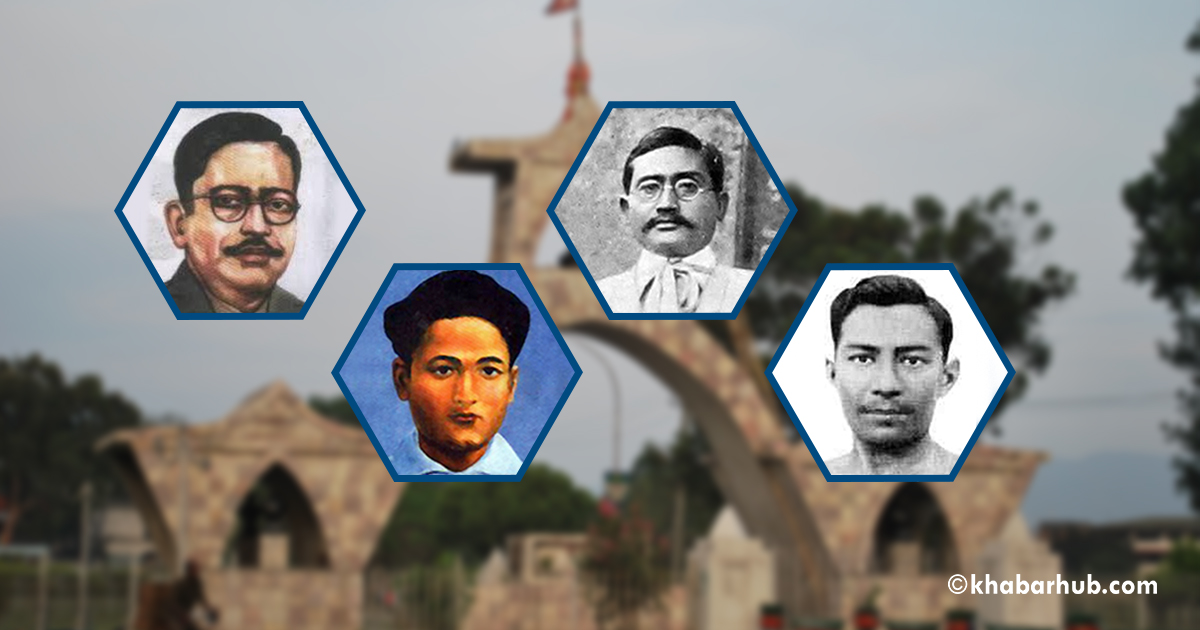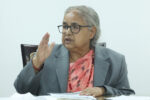KATHMANDU: Acknowledging the sacrifice made by the martyrs, Nepal observes Magh 16 (January 30) as the Martyrs Day, a day to pay homage, remember the sacrifice those great people made for the country and make commitment to follow the norms and values their sacrifice was meant for.
There was winter both in nature and the life of people. The season would change every year, but the winter in the life of people got worse every year. None dared to speak against the injustice, even the king was living a life like ‘house arrest.’ Then, some youths determined to get rid of the rule of terror came up with awareness campaign.
The cruel rulers brutally killed those youths in public in the cold month of January 1941. The tyrants expected the people to shut their mouth after the incident. But, it sparked the movement that later resulted in the end of the autocratic rule in 1950.
The seeds of awareness they sowed then got intense every year, the country saw many small and big changes since then. Many people are killed in various movements. The number of martyrs has gone higher too.
Who are martyrs?
Martyrs are those people who sacrifice their life or suffer persecution and death for higher values. Often they are the persons involved in self-less activities or advocating betterment for the larger community and those killed by the state for their beliefs.
Originally, confined to refer to those killed for their religious or moral values which may contradict with the ideals of the rulers, now the term is used widely for those people killed, esp. by the state, for the political causes.
“Martyrs are the people who sacrifice their life for better of humanity or their nation or national interest irrespective of their return in their own personal life,” says Tejeswor Babu Gwanga, a senior culture expert.
In modern days the martyrs are the people who sacrifice their life for nation, people and the ideal human values” Arbinda Rimal, a political analyst and writer who has witnessed decades of changes in Nepal, “However, lately, the martyrs are declared in the political quota, politicians want anyone of their side to be declared as martyr, it has demeaned the ones dying for nation.”
Dr. Govinda Tandon, a culture expert who has witnessed various movements of Nepal and the world regrets that the people whose ideals should have been the guiding principles for those who reach in power are often neglected.
“Lately, the definition of martyrs itself seems changing,” says Dr. Govinda Tandon a culture expert, “ it’s ridiculous that the governments lately distribute the certificates even to those who have died in accident or in personal clashes.”
The trend of ‘boasting’ about the number of party’s martyrs is really alarming. This denotes the decline of ethics and values of modern society. Vijaya Lal Shrestha, the youngest brother of martyr Gangalal Shrestha thinks it’s high time for the leadership to define or be clear about the notion of the word ‘martyr’. “There are martyrs of this or that party, it’s not good,” says octogenarian Shrestha, “The martyrdom has a reason. Martyrs are the sons and daughters of the nation, deemed so by the time.”
Where are the ideals?
Political analysts are dissatisfied with the ‘on sale’ status of certificates of ‘martyrs’ for getting favor during election has demeaned the real martyrs who sacrificed for the nation.
“The ideals of the martyrs are forgotten, martyrs are sold, martyrs are declared haphazardly,” says Prof. Krishna Khanal, a political analyst, “The ones who died against the system during Rana Regime are the real martyrs.” Prof. Khanal opines that not everyone who is killed by the state is a martyr.
“Warriors and the martyrs are not same,” Khanal says asking people not to take them synonymously, “it’s not unfair for the state to honor the people who sacrifice themselves for political reasons or ideals, the state should help their relatives in livelihood.”
However, he thinks putting them together with the great martyrs humiliates those who sacrificed themselves for humanity and human ideals lying far above any party’s agenda.
“ Now there are the 1 million rupee martyrs and 5 million rupee martyrs,” octogenarian Shrestha says sarcastically at the government’s treatment of the martyrs and martyrs’ families.
How’s the State response to the martyrs’
The heroes who die for the nation and national agenda are often neglected once the party they were once affiliated reaches to power.
The government’s treatment to the martyrs is regrettable. “It’s worse than that of Pancha’s,” adds Adhikari a witness of all major political movements of Nepal including the one of 1950’s, “They are remembered on the martyrs’ day only, their ideals are long forgotten.”
Adhikari is upset at the upturning of the values and lip-service paid to the martyrs on Magh 16.
Dr. Tandon echoes Adhikari about his comment on the status of the martyrs and says, the martyrs’ families are utterly neglected by the state. “It’s unfortunate that the governments who managed to reach in power with the martyrs’ sacrifice neglect the martyrs and their ideals.”
A witness of many changes of Nepal and the world, octogenarian Bijaya Lal Shrestha, the youngest brother of Ganga Lal Shrestha also opines that justice is neglected lately. “The corrupts are elected and re-elected; the politicians who proudly boast they have killed thousands of people are governing the nation,” Shrestha says.
Has the system failed?
“Despite the changes in the name of the system, we have not seen any substantive change in people’s lives,” says Binod Adhikari, a young academician who has been keenly studying about the changes in the political system and its impact in people’s lives.
He deems it natural not to meet all the political declarations as during election time the parties often make big promises to tempt the people. “We have to be realistic what one says in election in the developing countries like ours during election is many times exaggerated than reality,” Adhikari says adding, “What one should look at is, what substantive changes are made in infrastructure building and empowering people with knowledge about the rights and duties of both the state and the subjects.”
Adhikari thinks the sacrifice is not worthless, the social and political changes are noteworthy. Despite the corruption, some notable progress is in infrastructure building and awareness about social and political rights.
Once again everyone should keep in mind what Soren Kierkegaard said optimistically about the martyrs: The tyrant dies and his rule is over, the martyr dies and his rule begins.









Comment